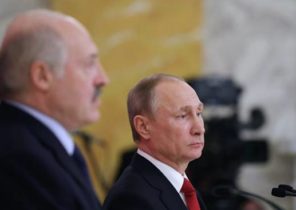
Wednesday, January 11, the State Duma has approved in the first reading the draft law on decriminalization of domestic violence. This was part of the determination of President Vladimir Putin to return to traditional family values.
In the summer of 2016 in Russia appeared the first law dealing specifically with domestic violence. Parliament introduced the concept of “close persons” in Article 116 of the Russian criminal code, which deals about the beatings. The group of “close persons” includes children, spouse, parents, brothers, sisters and other relatives of the suspect. Battery, causing them physical pain, but not entailed consequences on health are punished with imprisonment up to two years. Many Russians considered the law a necessary measure: according to groups dedicated to protecting the rights of women, domestic violence Russia die annually 10 thousand women. According to official statistics, 40% of serious violent crimes are committed within families.
However, the preachers of the traditionalist conservative ideology, which became extremely fashionable during the third presidential term for Putin, immediately started work aimed at the weakening of this law. From their point of view, this law is an example of an unacceptable state interference in the Affairs of the family.
At first glance, the Russian traditionalists are almost libertarians. Their unifying principle was opposition to the juvenile justice — concept, introduced in Russia the European social Charter and the UN Convention on the rights of the child. They argue that this concept destroys the family, giving the state the right to interfere in its internal Affairs. However, their tolerance to domestic violence — only in the most innocuous forms, they argue, that is in the form of rare slaps and slaps — originates in the middle ages written in a book called “the Domostroi”, which came to us in her version of the 16th century under the editorship of Ivan the terrible. In this book there is a Chapter devoted to “how to teach children and fear to save,” which reads: “And not olaba, beating infant: if the rod will punish him, will not die, but will be healthier for you, beating his body, his soul will save from death.” Another Chapter teaches husbands how to beat their wives: not to beat their wives in anger, they can not be beat in the face and chest, and stick — and especially feet.
Of course, no one believes that these steps need to listen today. On the official website of the Russian Orthodox Church published an article, which States that “Domostroy” — not a canonical text, and the beating of family members is contrary to the principles of Christianity. However, traditionalists argue that all over the just the right measure.
Speaking out against domestic violence law, Deputy Elena Mizulina, who authored the law banning public discussion of homosexuality, cited the example of a specific case. 17-year-old girl spent on the trivia portion of the family money set aside for the mortgage. When her mother found out, she slapped the girl, who then went to the police. But after the mother and daughter settled our differences, it was already too late to stop a criminal trial and now that the mother risks losing custody of the younger child. Mizulina also noted that this law is unjust because it punishes parents for spanking a child more severely than it hit the child of a stranger.
Mizulina introduced this law for consideration, but nobody was interested, until it is not interfered with the chief arbiter of family values in Russia: Vladimir Putin.
During the annual big press conference in December, one of the journalists, who represented a little-known website specializing in criticism of juvenile justice, asked Putin a very easy question. Get whether the Russian leader of the law that says a father, “slapovskogo child to work — as an educational measure rather traditional, Russian”, to two years in prison?
At first it seemed that Putin did not like the question. “Look, kids-it’s better not to spank, and not attribute it to any tradition, he said. — These slaps to beatings…” But then he agreed with this reporter that the “unceremonious interference in the family is unacceptable”. He promised to check why this law still exists and what measures on this issue are being taken. In response to the applause. After less than three weeks, the State Duma adopted in the first reading the bill on the decriminalization of domestic violence. Eventually this law will come into force and the petition for Change.org requiring more stringent measures in the fight against domestic violence, most likely, will simply ignore, despite the fact that it had been signed by 174 thousand Russians.
In 2015, the German channel ZDF showed a documentary about Putin, which referred to a “dossier of Western intelligence”, which allegedly gathered evidence that Putin drank and beat his wife Lyudmila during his service in the KGB in East Germany. At the moment Putin is divorced, but he maintains his allegiance to traditional family values.
International experience proves that aggressive laws against domestic violence and reduce its incidence. As a result of those changes that will be made soon, Russia will get the list of European countries with the weakest laws in this matter: if the fact of beating of a child or spouse reported to law enforcement agencies for the first time and if the beating was not received serious injuries, the accused faces a fine as per administrative violation, although the facts a serious beating will remain a criminal offence.
The problem is that violence is allowed in small doses. Nothing will prevent the “traditionalists” and in the future to go crazy.
The new conservative ideology Putin is taking Russia further and further away from the West and its values. For Putin, the decriminalization of domestic violence is another step on the road to ideological sovereignty. But, in fact, Russia is slowly returning to earlier times when children and wives were entirely at the mercy of the whims of men, who all always went with it.







